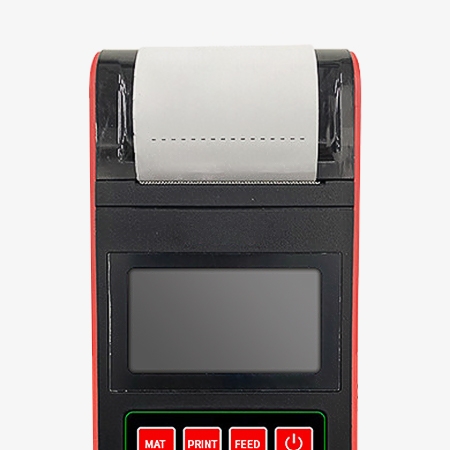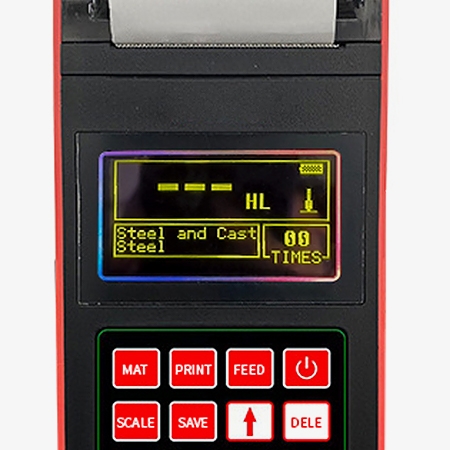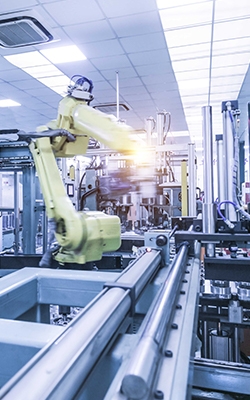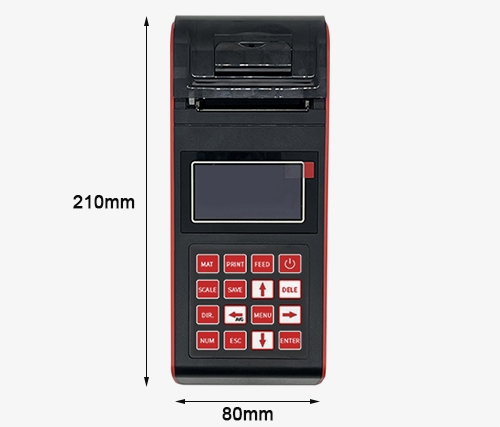A digital Leeb hardness tester with a printer is a compact, handheld device used to measure the hardness of metals and other solid materials quickly and accurately. The working temperature of this hardness tester is between -10 ℃ to 55 ℃. Its portability, ease of use, and real-time data printing make it an essential tool for engineers and inspectors who need fast, reliable hardness measurements on-site.

Digital Leeb Hardness Tester Equipped a Built-in Printer
- The built-in printer allows users to instantly print test results on-site. This feature is especially valuable for field inspections and production environments where documentation and traceability are essential.
- Printed results can serve as valid documentation for quality assurance, audits, or customer reports.
- This digital Leeb tester supports multiple hardness scales (HL, HB, HRA, HRA, HRC, HRC, HV, HS), allowing accurate conversion for different materials such as steel, aluminum, copper, and cast iron.

LCD Screen & High-brightness Display
- The LCD screen provides clear, real-time readings of hardness values, eliminating the need for manual calculation or conversion. The font of this portable Leeb hardness tester features a high-brightness display, allowing the user to operate effectively even in dimly lit environments.
- The digital display also helps reduce human error by showing precise test results instantly, improving both accuracy and productivity.
Applications
Leeb hardness testers are widely used for on-site hardness testing of large and heavy metal parts. Their primary application is in quality control and maintenance across various industries, including manufacturing, automotive, shipbuilding, and power generation. They are especially useful for testing hard-to-move components like large castings, forgings, shafts, pressure vessels, and welded structures.

Shipbuilding Industry

Manufacturing Industry

Metal Processing

Automotive Industry
| Model | SISCO-HT-XH950 |
| Measurement Range | HLD (170~960), HRC (17.9~69.5), HB (19~683), HV (80~1042), HS (30.6~102.6), HRA (59.1~88), HRB (13.5~101.7) |
| Measurement Direction | 360° |
| Hardness Range/Scale | HL, HB, HRB, HRC, HRA, HV, HS |
| Measurable Material | Steel and cast steel, alloy tool steel, stainless steel, grey cast iron, ductile cast iron, cast aluminum alloy, copper and zinc alloy, copper and tin alloy, pure copper |
| Upper and Lower Limits | (170-960)HLD |
| Data Storage | Max 600 groups (number of shocks 32~1) |
| Display | LCD display |
| Printer | Built-in thermal printer |
| Working Voltage | 7.4V lithium battery pack |
| Charging Power Supply | 9V 500mA, charging time about 2.5~3.5h |
| Data Interface | USB 2.0 |
| Operating Temperature | -10 ℃~55 ℃ |
| Storage Temperature | -20 ℃~75 ℃ |
| Relative Humidity | ≤90% |
| Dimension | 210*80mm (main unit) |
| Weight | About 6kg (a whole set) |
Dimension:

Q1: What is Leeb hardness tester?
A1: A Leeb hardness tester is a portable device used to measure the hardness of metals and alloys by the Leeb rebound principle. It operates by releasing a standardized impact body against the test surface and measuring the rebound velocity.
Q2: What does the Leeb hardness value (HL) represent?
A2: The Leeb hardness value (HL) represents a measure of a material's surface hardness based on the rebound principle. It is determined by the Leeb hardness test, where a small, hard impact body is propelled against the test material’s surface. The device measures the velocity of the impact body both before and after striking the surface. The Leeb hardness value is calculated from the ratio of the rebound velocity to the impact velocity, multiplied by 1000, and is expressed in HL (Hardness Leeb) units.
Q3: What materials can be tested using a Leeb hardness tester?
A3: A Leeb hardness meter is primarily used to measure the hardness of metallic materials. It is suitable for testing metals such as steel, cast iron, cast steel, stainless steel, and various alloys.
Tips: Is the digital Leeb hardness tester suitable for on-site testing?
Yes, the digital Leeb tester is highly suitable for on-site testing. The device is compact, lightweight, making it easy to carry and use in various locations, including tight or elevated spaces. It provides rapid results through digital readouts, reducing the risk of human error associated with manual interpretation. Additionally, this portable Leeb hardness tester comes with memory storage (max 600 groups), data transfer capabilities, and multiple hardness scales, allowing users to record, analyze, and compare measurements conveniently on-site.
Thank you for buying industrial test and measurement equipment on SISCO.com, all products sold by SISCO and the partner cover a 12 months warranty, effective from the date of receiving the products.
What is covered?
SISCO is responsible for providing free spare parts, and free technical support to assist the customer to repair the defective products until the problem is solved.
What is not covered?
- Product purchased from anyone other than a SISCO store or a SISCO authorized reseller.
- Expendable parts.
- Routine cleaning or normal cosmetic and mechanical wear.
- Damage from misuse, abuse or neglect.
- Damage from use of parts other than SISCO approved.
- Damage from use outside the product’s usage or storage parameters.
- Damage from use of parts not sold by SISCO.
- Damage from modification or incorporation into other products.
- Damage from repair or replacement of warranted parts by a service provider other than a SISCO authorized service provider.
- Damage caused by the application environment not meeting the product usage requirements and the failure to perform preventive maintenance.

